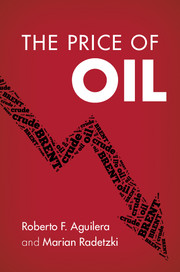Book contents
- Frontmatter
- Contents
- Figures
- Tables
- Acknowledgments
- 1 Introduction and overview
- PART I OIL'S EXTRAORDINARY PRICE HISTORY: HOW CAN IT BE EXPLAINED?
- PART II THE SHALE AND CONVENTIONAL OIL REVOLUTIONS: LOW PRICES AHEAD
- PART III GLOBAL IMPLICATIONS FOR THE MACROECONOMY, THE ENVIRONMENT AND FOR POLITICS
- CONCLUSIONS
- References
- Index
1 - Introduction and overview
Published online by Cambridge University Press: 05 November 2015
- Frontmatter
- Contents
- Figures
- Tables
- Acknowledgments
- 1 Introduction and overview
- PART I OIL'S EXTRAORDINARY PRICE HISTORY: HOW CAN IT BE EXPLAINED?
- PART II THE SHALE AND CONVENTIONAL OIL REVOLUTIONS: LOW PRICES AHEAD
- PART III GLOBAL IMPLICATIONS FOR THE MACROECONOMY, THE ENVIRONMENT AND FOR POLITICS
- CONCLUSIONS
- References
- Index
Summary
This brief introductory chapter has two objectives. First, it elaborates why, in our view, the chosen subject is of sufficient significance to warrant a book. And second, the chapter provides an overview of the book's structure so as to help orient the reader about the content that follows.
THE SIGNIFICANCE OF OIL AND ITS PRICE EVOLUTION TO THE WORLD ECONOMY
A number of reasons have motivated our choice of oil, along with its past and expected future price evolution, as the subject in focus for the present book.
A first reason is the importance of oil in the world economy. In the early 2010s, the annual production value of this commodity, when measured at international prices, could be assessed at between $3500 and $4000 billion. World oil exports were reported in a range of $2200 and $2800 billion. As is clear from Table 1.1, oil dwarfs other leading primary commodities in the service of humanity. Oil's dominance among commodities was apparent already before its spectacular price rises after 1972. In 1970–1972, oil alone represented an export value equal to the aggregate of the next nine largest commodities (Radetzki, 1990).
Oil's importance is not limited to the primary commodity universe. It also stands out in the global macroeconomy. The value of oil production in 2013 corresponded to 4.8 percent of global GDP, while the export value it generated was equal to some 12 percent of global goods trade.
A second reason why an investigation of oil and its price evolution has special significance is the “indispensability” of this commodity. It is hard to replace in the short and medium term (i.e., there is no clear alternative to oil in the foreseeable future), so the volumes demanded in its major uses are not much affected even by large price shifts. The price increases experienced in the past have resulted in shrinking demand in some markets, most importantly power generation, where oil has been successfully replaced by expanded usage of coal, gas, nuclear and renewables. The dominant market segment for oil – as a fuel for transport on roads, in the air and across the seas – continues to persevere despite the price changes. So far, at least, large-scale substitutes to oil in these markets are conspicuous by their absence. This makes the global economy highly vulnerable to oil supply disruptions.
- Type
- Chapter
- Information
- The Price of Oil , pp. 1 - 8Publisher: Cambridge University PressPrint publication year: 2015
- 1
- Cited by



